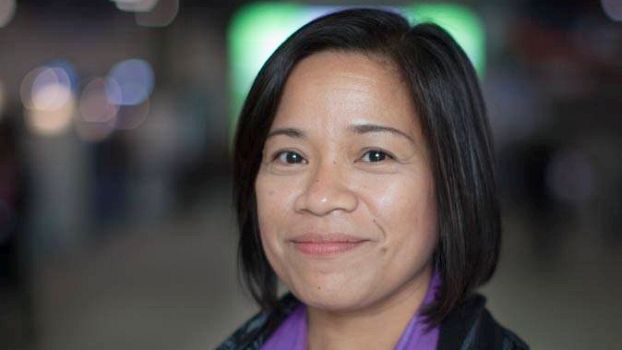
1.5 years after the celebrations of the Paris Agreement, the climate crisis is still ongoing. Between May 8 and May 18, 2017 climate negotiators met in Bonn during the annual UNFCCC intersessional to continue the discussions on how to implement the Paris Agreement. While the process of kicking off mechanisms to actually implement the accord is moving on slowly, the meeting was additionally stalled by the US announcement of a possible pull-out from the Paris Agreement. Further, the influence of the corporate sector and especially the fossil industry within the UNFCCC became an obvious contradiction, that was heavily criticized by representatives of civil society present at the intersessional. The Rosa-Luxemburg-Stiftung was there together with several partners from the global south. One of them is Maria Theresa (Tetet) Lauron of IBON International from the Philippines. We talked to her during her visit to Bonn and asked her about the importance of the civil society and especially progressive movements to be present at the UNFCCC and what she expects from German movements and the left concerning international climate politics.
Rosa-Luxemburg-Stiftung: Tetet, IBON International is an organization from the Philippines committed to social justice and social transformation as well as committed to engage for democracy, peace and equality. IBON International and you personally, Tetet, regularly take part in the negotiations on the UNFCCC. Why do you think it is important for progressive social movements and civil society to be part of the international climate diplomacy?
Tetet: The UNFCCC negotiations is the international community’s response to addressing climate change and its impacts. Decisions that would ultimately spell the difference between survival and death of the planet and all its inhabitants rest on how well (or not), the world’s leaders come to an agreement on the need to take action to avert a climate crisis and extend a hand to those already feeling the brunt of climate change. However, it has been more than 20 years now that ‘international climate diplomacy’ has been trying to bring ‘solutions’, but so far it has not been successful at doing so. We see that interests of big, industrialized countries (and their corporations) take precedence, and ‘solutions’ agreed on mean making ‘more business than usual’ out of the climate crisis. Governments and the UN, need to be constantly reminded and challenged, and exposed, if they don’t live up to the people’s aspirations for urgent and thoroughgoing solutions, and this is where progressive social movements and civil society comes in.
And why is it important for the work of IBON International and your work in the Philippines to be here in Bonn?
The Paris Agreement was welcomed with such euphoria by governments and others, including some in civil society. It can be debated that the Agreement has a lot of weaknesses, and will never measure up to what is needed by science and equity. But since it’s there – we have to make sure that when governments do sit down to roll out its implementation, this will not mean further negative impacts for the people. We also have to try and raise the bar, in terms of governments’ commitments to climate action. There is a huge threat that in the name of mitigation, for instance, this shift towards renewable energies may actually cause the displacement of millions of people – those whose livelihoods depend on ‘dirty fossil fuels’ - while at the same time allowing the continued entry of polluting industries in the name of foreign investments.
The UNFCCC is being challenged to uphold the integrity of the process.
As you just mentioned, the Paris Agreement has been celebrated widely as a break through that would save our planet. However, its implementation so far lacks proper commitment by national governments, especially the ones of rich countries. This year the negotiations will take place under the presidency of Fiji but be hosted in Germany. Germany also hosts the G20-summit in July and has its own national parliamentary elections in September. What do you expect from the industrialized countries and especially Germany during the negotiations this year? What should German NGOs and movements and progressive political parties as DIE LINKE push for in terms of climate politics?
The ‘mantra’ nowadays is on how the private sector is an indispensable actor in sustainable development. In all the different for a – be it at the UN, OECD and elsewhere, businesses, and I mean corporations, are hailed for having the resources and technology to contribute to solving the world’s problems. Policies are being drawn, regulations removed, all for the sake of attracting private capital. The UNFCCC is being challenged to uphold the integrity of the process - i.e. led by Parties/Member States. However, corporate influence (fossil fuel industries, agrochemical companies etc.) in the negotiations has been growing and has put under question a fundamental conflict of interest. It does raise serious questions that the UNFCCC would not even hear of having a clear policy on this. Perhaps it is precisely because there IS an inherent conflict of interest. And Germany is one such government that has made a very strong pitch for the private sector. Businesses are here in pursuit of super profits – their very nature is in contradiction to the promotion of the public good and of saving the planet. This should be made not just an election issue – but a people’s issue as well.
The interview was led by Nadja Charaby of the Rosa-Luxemburg-Stiftung on May 11, 2017. Asked if she wanted to add a comment about Donald Trump’s announcement to make a final decision on the US pull-out from the Paris Agreement on June 01, 2017, Tetet just said: “Shall we add: ‘dump trump’ and make climate safe again”.